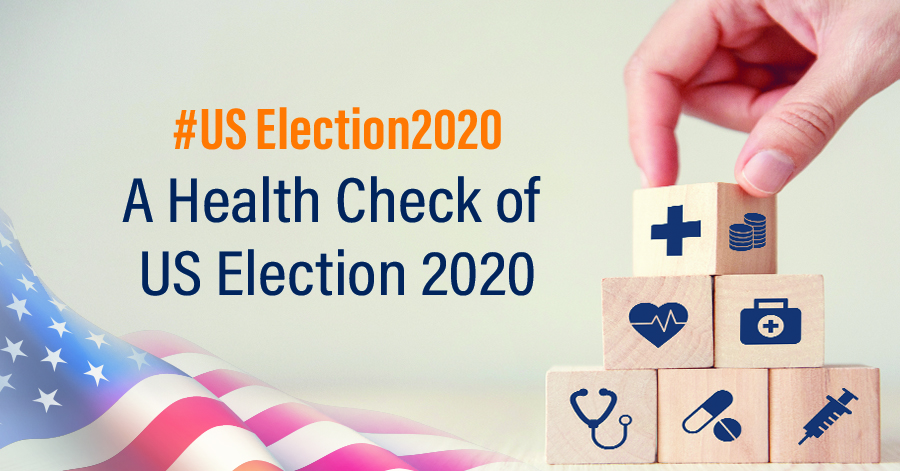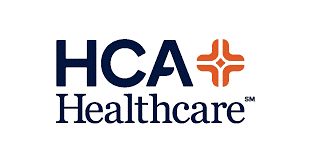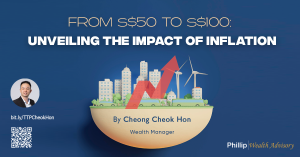A Health Check of U.S. Election 2020 October 19, 2020

This article is part of the US Election series brought to you by POEMS. #USElection2020.
Summary outline:
- Drug costs are close to the American voter’s heart. Both presidential candidates know this and have pledged to reduce healthcare costs
- If Trump wins, expect pharmaceutical and health-insurance counters to rise
- If Biden wins, expect healthcare providers and biotech stocks to be winners
- Sector outlook looks positive, regardless of who wins
- Impact on drug profits may be offset by expanded healthcare coverage and more funding for R&D in advanced medical technologies
Healthcare is one of the main sticking points in the US presidential elections as Americans place a high priority on healthcare policies. A survey of American consumers by HRI in 2019 suggested that 71% of adult Americans were more likely to vote for a candidate based on his healthcare proposals.
Here’s a lowdown on Biden’s and Trump’s proposals for the sector and their potential impact on relevant stocks.
AT A GLANCE
| Pharmaceutical
|
Healthcare Provider:
Biotechnology and Medical Devices:
|
Source: PSR
1.DRUG PRICES
Increasing drug prices have been lifting healthcare and insurance costs in the US. According to National Health Expenditure data, drug spending in the US has increased by more than 40% in the past 10 years. The rise is attributed to research and innovation costs, plus sales and marketing costs, as drug advertising on TV is allowed in the US. Pharmaceutical companies are also merging and acquiring firms and buying back shares. This leads to higher expenses, which are passed through to consumers via higher drug prices.
According to a 2020 study published by the University of Pittsburgh’s Centre for Pharmaceutical Policy and Prescribing, the net cost of prescription drugs had increased three times faster than the rate of inflation in the U.S. over a period of 10 years. This is a worrying trend for Americans.
What does Trump propose?
President Donald Trump pledged to reduce the cost of drug prescriptions during his last election. However, in the past three years, drug prices have not budged or decreased much. Instead, they have risen exponentially over the years.
While Trump said he would come up with a cheaper and better healthcare plan, no plans have been implemented or executed yet, as the laws have not been passed by Congress. Some executive orders signed by Trump – not passed into law – included:
- Getting Medicare to pay the same prices for drugs as in other countries, where the cost of drugs is lower
- Mandating drug companies to make known their drug prices in their TV advertisements
- Discounting pricing for certain drugs such as insulin and epinephrine for lower-income patients
What does Biden propose?
The Democrats (Biden) have proposed to track drug prices and not let them rise faster than inflation. They also want to regulate the drug patent system that currently deters new competitors from joining and prevent abuse. On top of that, they want to stop ‘surprise billing’. This refers to unexpected large bills faced by patients for treatments that their insurance providers do not cover. The Democrats also aim to revoke the right of drug companies to negotiate with Medicare over drug prices. Their various proposals would similarly require approval from the Congress and may be implemented together with other healthcare proposals they have in mind.
What does it mean for the market?
Both candidates’ proposals appear to have a common goal: reduce drug prices and healthcare costs, to make healthcare more affordable to Americans.
If either manages to concretise and enforce his plans as the next President, pharmaceutical stocks could fall, as lower drug prices may hurt margins and profitability.
Pharmaceutical stocks that we would look out for include:
- Merck
- Pfizer
- Amgen
- GlaxoSmithKline
2. MEDICARE
Medicare is a federal health insurance programme largely for Americans aged 65 and above (retirees). It also covers a small minority of younger people with disabilities or people with end-stage renal disease.
Medicare has four parts:
- Medicare Part A (Hospital Care)
- Medicare Part B (Medical Services)
- Medicare Part C (Medicare Advantage Plans)
- Medicare Part D (Prescription Drug Coverage)
Basic Medicare usually refers to Part A + Part B. Beneficiaries have the option to purchase Part C and/or Part D from private insurance companies, to supplement their Basic Medicare. This is because Basic Medicare only covers 70-80% of healthcare payments and does not have a cap on co-payables. Currently, about one-third of the beneficiaries are enrolled in Medicare Advantage Plans.
What does Trump propose?
President Trump, throughout his current term, has been steering towards privatising Medicare. He has accelerated enrolment in private plans such as Medicare Advantage. If re-elected, he intends to cut payroll tax funding of Medicare permanently. This would indirectly remove federal funding for Medicare and push it further towards the private health insurance market.
If President Trump is re-elected:
Expect a greater shift towards private health insurance, Medicare Advantage.
This would benefit insurance companies.
What does Biden propose?
Joe Biden intends to lower the enrolment age for Medicare from 65 to 60. He also wants to extend Medicare coverage to dental, vision and hearing treatments, all of which are currently excluded.
If Joe Biden is elected:
Expanding insurance coverage may increase utilisation of medical services.
This would benefit healthcare service providers.
3. OBAMACARE
Obamacare is also known as the Affordable Care Act (ACA) of 2010. This strives to provide affordable medical insurance for all Americans. It also aims to protect consumers from insurance companies that intentionally mark-up patient costs or restrict care. Opinion on the ACA is mixed. Die-hard supporters view it as a must for Americans due to its affordability and wide coverage. Critics argue that the tax hikes and increased insurance premiums resulting from the Act are detrimental to Americans.
What does Trump propose?
Trump wants to “repeal and replace” the ACA with an “American-First Healthcare Plan”. The latter does not pay for prescription drugs or hospital stay and will require consumers to be medically assessed before enrolment. This could possibly lead to higher premiums, based on a patient’s medical condition and age.
The current ACA aims to “close the coverage gap”, by mandating drug manufacturers to pay rebates of 50% of the prices of branded drugs during the insurance coverage gap phase. This is to ensure that a patient’s payment is equivalent to 80% of the discounted prices of all brand-name drugs provided. Adding to the drug companies’ woes is the Bipartisan Budget Act of 2018, which sets rebates at 70%.
If Trump is re-elected and successfully repeals the ACA:
Stock prices of pharmaceutical manufacturers such as Pfizer and Merck might rise as the companies will have greater control over their pricing and thus, profitability.
Insurance companies can also benefit from signing up the pool of consumers rejected by the Trump administration’s proposed healthcare plan.
What does Biden propose?
Biden, on the other hand, is trying to build on the existing ACA. He intends to give Americans more insurance choices, cut healthcare costs and simplify their navigation of the healthcare system. Biden also intends to increase equipment manufacturing, testing and tracing and the development of novel therapies for COVID-19. This direction could hugely benefit the biotech and medical-device industries.
If Biden is elected and executes his plan:
Biotech companies such as Amgen and Gilead might benefit from increased funding for the biotech industry.
So might medical-device companies such as Abbott Laboratories.
Outlook
We see a positive outlook for the US healthcare sector, regardless of who gets elected, as long as the next President can get the bills passed and executed. While cutting drug prices may hurt pharmaceutical companies, the impact may be offset by other healthcare plans that include expanding healthcare coverage and more funding for research and development in advanced medical technologies.
Follow us on our US election series as we bring you through the detailed breakdown of the various sectors leading up to the US election on 3 November 2020.
Reference:
1. https://www.barrons.com/articles/how-the-2020-presidential-election-could-affect-health-care-stocks-51597311001
2. https://www.webmd.com/health-insurance/news/20200929/closer-look-trump-biden-plans-on-health-care
3. https://www.usnews.com/news/health-news/articles/2020-03-03/us-drug-prices-have-risen-three-times-faster-than-inflation
4. https://www.ft.com/content/e92dbf94-d9a2-11e9-8f9b-77216ebe1f17
5. https://www.nbcnews.com/politics/white-house/trump-signs-eos-health-care-does-little-change-existing-legislation-n1241022
6. https://www.priorityhealth.com/medicare/medicare-explained/parts-a-b
7. https://www.cnbc.com/2020/08/22/why-medicare-coverage-could-expand-under-a-biden-presidency.html
8. https://www.medicaid.gov/medicaid/prescription-drugs/medicaid-drug-rebate-program/index.html
9. https://www.americanactionforum.org/insight/understanding-the-policies-that-influence-the-cost-of-drugs/
10. https://joebiden.com/healthcare/#
11. https://www.healthline.com/health/consumer-healthcare-guide/pros-and-cons-obamacare
Disclaimer
These commentaries are intended for general circulation. It does not have regard to the specific investment objectives, financial situation and particular needs of any person who may receive this document. Accordingly, no warranty whatsoever is given and no liability whatsoever is accepted for any loss arising whether directly or indirectly as a result of any person acting based on this information. Opinions expressed in these commentaries are subject to change without notice. Investments are subject to investment risks including the possible loss of the principal amount invested. The value of the units and the income from them may fall as well as rise. Past performance figures as well as any projection or forecast used in these commentaries are not necessarily indicative of future or likely performance. Phillip Securities Pte Ltd (PSPL), its directors, connected persons or employees may from time to time have an interest in the financial instruments mentioned in these commentaries. Investors may wish to seek advice from a financial adviser before investing. In the event that investors choose not to seek advice from a financial adviser, they should consider whether the investment is suitable for them.
The information contained in these commentaries has been obtained from public sources which PSPL has no reason to believe are unreliable and any analysis, forecasts, projections, expectations and opinions (collectively the “Research”) contained in these commentaries are based on such information and are expressions of belief only. PSPL has not verified this information and no representation or warranty, express or implied, is made that such information or Research is accurate, complete or verified or should be relied upon as such. Any such information or Research contained in these commentaries are subject to change, and PSPL shall not have any responsibility to maintain the information or Research made available or to supply any corrections, updates or releases in connection therewith. In no event will PSPL be liable for any special, indirect, incidental or consequential damages which may be incurred from the use of the information or Research made available, even if it has been advised of the possibility of such damages. The companies and their employees mentioned in these commentaries cannot be held liable for any errors, inaccuracies and/or omissions howsoever caused. Any opinion or advice herein is made on a general basis and is subject to change without notice. The information provided in these commentaries may contain optimistic statements regarding future events or future financial performance of countries, markets or companies. You must make your own financial assessment of the relevance, accuracy and adequacy of the information provided in these commentaries.
Views and any strategies described in these commentaries may not be suitable for all investors. Opinions expressed herein may differ from the opinions expressed by other units of PSPL or its connected persons and associates. Any reference to or discussion of investment products or commodities in these commentaries is purely for illustrative purposes only and must not be construed as a recommendation, an offer or solicitation for the subscription, purchase or sale of the investment products or commodities mentioned.
About the author
Goh Wei Yan (Equities Dealer), Sylvia Lim (Equities Specialist) and Edmund Sam (Equities Specialist)
Wei Yan joined Phillip Securities in September 2019 as an Equity Specialist in Phillip Investor Centre. He graduated from Monash University with a Bachelor’s Degree in Accounting and Finance. He has the knowledge to provide fundamental and technical analysis for stocks and often contribute to stock ideas.Graduated from Singapore Management University with the Bachelor of Business Management, majoring in Finance, Sylvia is knowledgeable in the field and often contributes to stock ideas and market watch. She has a wealth of experience in providing investment advisory to clients and often conducts seminars on various topics.Joined Phillip Securities in March 2019 as an Equity Specialist. Edmund has knowledge in the equity market and has conducted several seminars on various investment topics such as fundamental and technical analysis.










 Back in Business: The Return of IPOs & Top Traded Counters in March 2024
Back in Business: The Return of IPOs & Top Traded Counters in March 2024  From $50 to $100: Unveiling the Impact of Inflation
From $50 to $100: Unveiling the Impact of Inflation  Japan’s Economic Resurgence: Unveiling the Tailwinds Behind Nikkei 225’s Record Leap
Japan’s Economic Resurgence: Unveiling the Tailwinds Behind Nikkei 225’s Record Leap  What Makes Forex Trading Attractive?
What Makes Forex Trading Attractive? 









